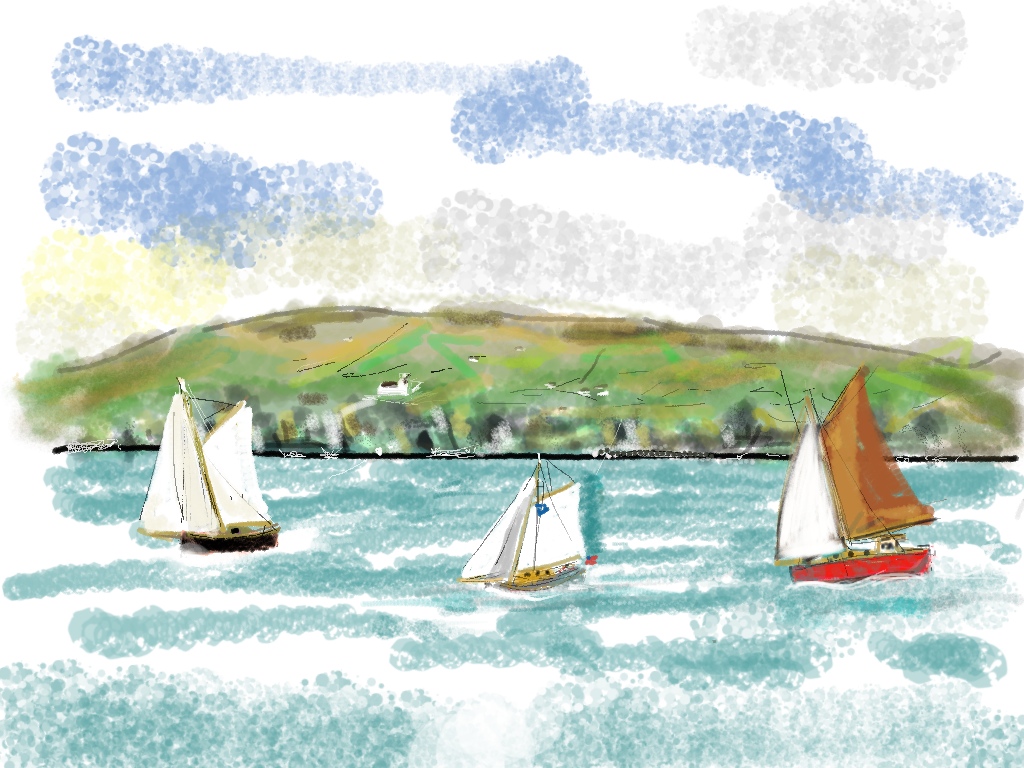In mid-May, the OGA50 Round Britain Challenge fleet were stormbound in Falmouth. Solent Gaffer, Ben Collins brings us another update on the state of the weather as boats and crews are battered by the storm force winds in the harbour.
It’s not often that one talks of epic boating adventures without so much as leaving one’s berth on a ‘walk ashore’ pontoon in a marina. But for those who like stories of extremes, here’s a new one. It was a wet and leaden day on 16 May, 2013 in Falmouth Harbour. Much of the OGA50 Round Britain Challenge fleet were hunkered down, tied up at the Visitors’ pontoons awaiting a brighter weather forecast to get round the Lizard.
The winds had been blowing against us for days and today they carried drenching rain as a bonus, driven eastwards over the town and across what we thought was a sheltered haven. It was a lazy day aboard, cleaning up, doing the washing, reading with the skipper ashore taking his shower. Then, out of nowhere came a strange sound of something distant and strong, then it faded. A minute later something seemed to give a sudden tug at the mast. A gust ripped at the rigging, tilting the boat dramatically. I peered out of the ports, the skies looked ominous to the north west. ‘Syene’ rocked gently back to an even keel. Clearly just a strong puff of wind, I continued reading.
Then came a deep roar across the quayside rooftops, trees flexing, spring leaves flying, a plastic bin scudding across the dock. Mooring ropes across the marina creaked and snapped tight as boats leaned over once more, hit buy a blast cutting through their masts. Suddenly ‘Syene’ lurched once more, tilting so far over her lee topsides were forced down almost to the toerail pinning us to the pontoon and crushing our fenders like punctured beachballs. No time for wet gear, I grabbed the cockpit cushions and jammed them as best I could between our hull and the pontoon. The wind was by now screeching. All around the water was spikes and lashing, waves soon coming over the pontoons, which were bucking and swaying as if possessed. With so many boats, they would surely be torn from their mooring chains.





Two OGA boats anchored off in the main harbour were fast receding downwind, their shapes barely discernible in the swirling spray, crews dashing about fighting for control as they slipped ever closer to the far harbour pontoons, threatening to be smashed against their neighbours on the way. OGA crews leant to the wind, taut ropes were being doubled up. Boats on the lee side of pontoons sheering out, many too far for their shorestuck crews to get back aboard. Leaning their backs to the wind, just keeping their balance on the rocking platforms, seemed increasingly precarious as they ground together and snatched at their chains. We prayed the engineers had done their stress calculations for 60 mph winds.
Then a loud retort, like gunfire, something dramatic, I looked at our hull, had our fenders finally capitulated? Then I saw the next boat, across on the downwind side of us was adrift, it’s aft mooring rope hanging shredded in the water. No owner aboard and the hull swinging into the wind, the whole vessel leaning over as it started to fish-tail on its bow tether, swinging back and forth in the leaping waves curling round and pounding its bow against the concrete edge.

It’s often at times like this that the absurd happens. As I stood waiting for more explosive ropes to part, and as the wind shrieked even louder amid the mayhem, along the pontoon came a frogman. Sadly, I think, they now boringly call these rubber amphibious people lurking in our harbours simply ‘divers’. He was leaning against the wind carrying his kit when the mooring line parted. No conversation was possible over the wind. Eying the marauding boat he calmly put his oxygen cylinder down and leapt from the swaying pontoon like the best of stuntmen. Lifting himself over the rail he grabbed a rope and threw it in my general direction. Together we winched her in, the rope taut as iron. The wind howled, all the OGA crews were at action stations. All fully kitted out in their heavy weather gear, tending fenders and ropes. Who needs to go ocean sailing when you can get all the effects on a marina walk ashore?
The blast lasted a good hour, there were varying reports of 60, even 80 mph winds along the coast. The RNLI were busy in the harbour struggling to pull the anchored boats away from disaster. Then it gradually eased, those boozing in the pub on the nearby quay hadn’t even been aware of the maelstrom. We climbed back aboard, cast off our soaking gear and went to join them and warm our aching bodies. At the bar, without his black suit on, was the frogman in person. We introduced ourselves. He had just been passing by after an afternoon under the water. He had surfaced to mayhem and felt the need to leap to the rescue. He probably had the best clothing for the occasion, “‘”I was boiling hot in my underwater suit,” he commented, “I was in my own element leaping about in the rain.” And for all you children reading this, that’s what I call a real ‘frogman’. We drank dark Guinness to strong ropes and the pontoons’ tough iron mooring chains. And if this soaking freezing weather continues, I’m gonna buy myself a big black rubber suit to complete the Round Britain Challenge in style and warmth!

You must be logged in to post a comment.